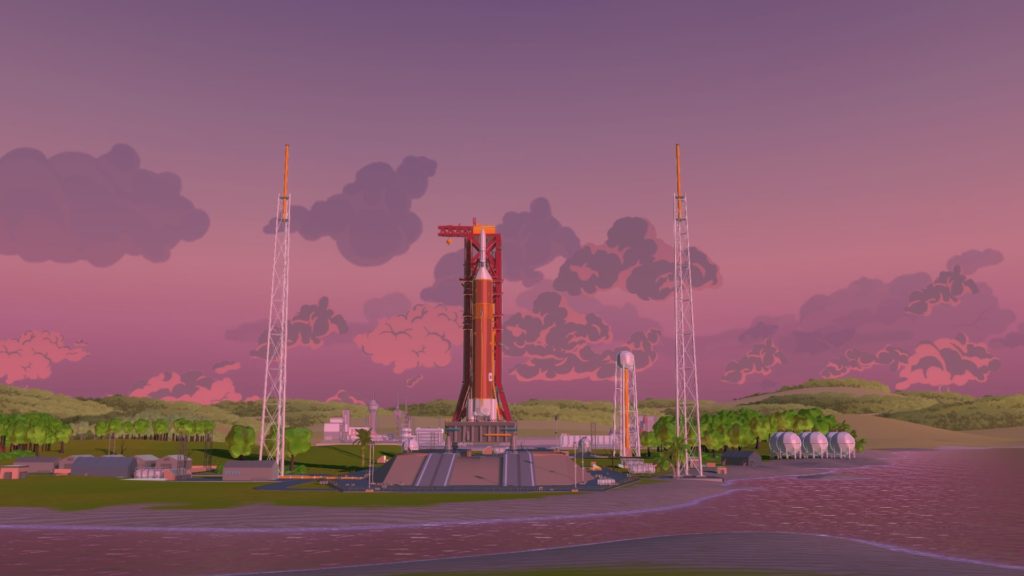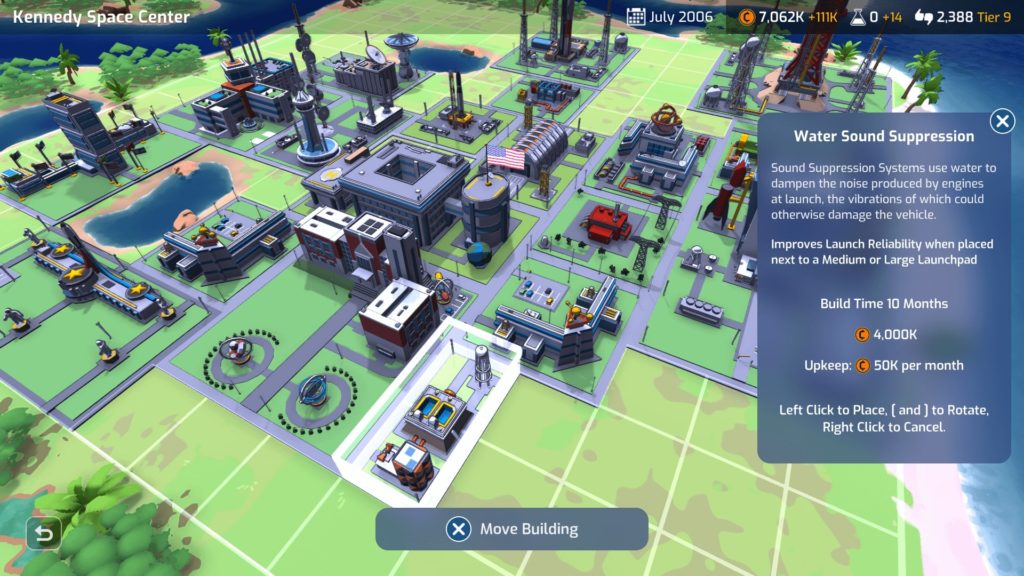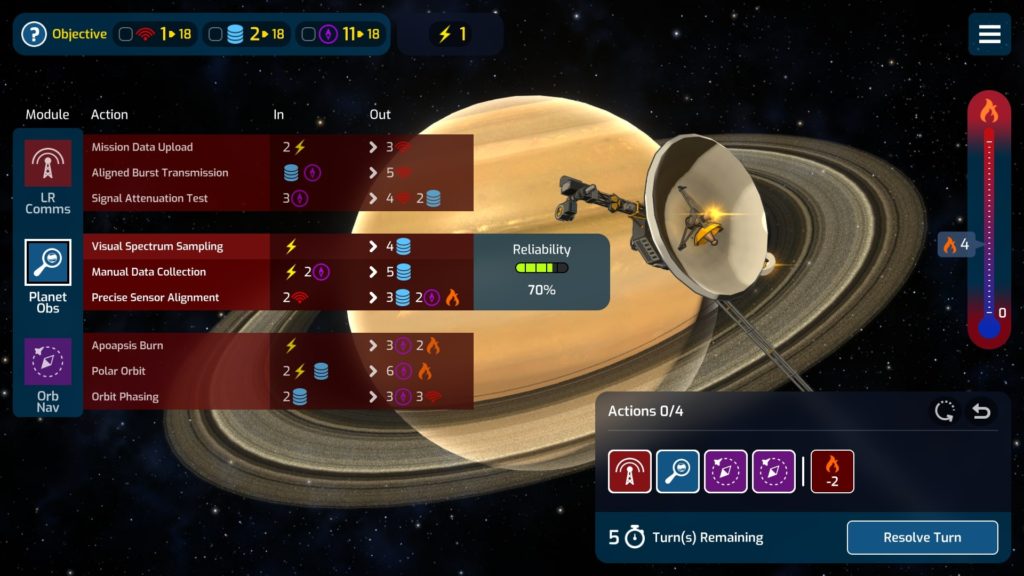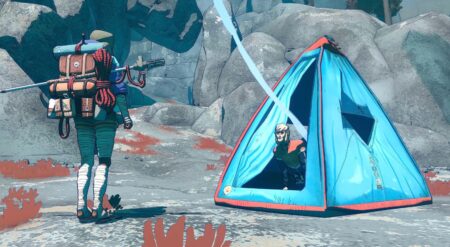
Mars Horizon is a strategy simulation game developed by Auroch Digital and published by The Irregular Corporation. Created with support from the European Space Agency (ESA) and the UK Space Agency, Mars Horizon has players take control of a major space agency and lead it through the history of space exploration. Starting at the beginning of the space age in January 1957 all the way through landing the first astronauts on Mars. The game was designed with the intent to be as real and authentic as running your very own space agency in an educational way. This includes learning about the history of space exploration, the technology involved, and more.
Mars Horizon starts out with players choosing to play one of five major space agencies. Each agency has its own preset traits and diplomacy towards the other agencies informed by the original landscape of the “Space Race.” Players are allowed to customize these agencies to their liking which can include randomizing the diplomacy between agencies or selecting their own traits. Ultimately, there are roughly 44 traits players can select like “reduce building cost,” “increase science,” or “increase funding” to name a few. Each trait is given a numerical value ranging from -2 to 2. Players can select up to five traits so long as the traits add up to no more than four points. This really allows players to get creative with their traits and allows for a unique experience each playthrough.
This mix and matching of positive and “negative” effects is something that is common throughout Mars Horizon. This is one of my favorite parts of the game because it reflects reality. Increasing one area of focus may and usually does decrease another in real life, so seeing this in a sim is a welcome addition and something that seems to be left out of games these days.
Additionally, all of the gameplay operates on a dice rolling mechanic. This means that all successes and failures are based on a rolling of a dice. The player’s job is to make the percentage of success the highest possible and hope for the best. I appreciate the fact that Mars Horizon made it to nothing can be 100% certain as even in the best of scenarios there is still a chance for failure. I know some players may not like this type of gameplay as it leaves plenty of chance involved and out of their control, however, I really enjoyed it.
Because this game was made with the intent of realism and authenticity anyone that has ever done an experiment of any kind knows no matter how many times you check things there is always a chance for failure and that your job is just to design the best you can and hope it works. Now, it does sting when you had a 99% chance for success only to hit that 1%, but sometimes that is just what happens in the world of science. While players may not have complete direct control over success and failures this does put more emphasis on the planning, managing, and overall decisions being made. This also gives plenty of realism aspects to the game in that the missions themselves can be costly so a failure can be a real setback to one’s space agency.
This leads to plenty of give and take decisions on multiple levels. Should you launch that rocket with only an 80% success chance or wait an additional few months so the success rate is 85%? Should you cut costs on the rocket booster or save up for a more reliable one? The choice is yours. Now, this also means the gameplay itself is slow and methodical which can be a turn-off to many players. In fact, many people don’t realize that “doing science,” in general, is a slow and sometimes boring process. Much like Beyond Blue, Mars Horizon is built with that authentic aspect in mind.
Beyond this, there are four major gameplay aspects of Mars Horizon and each adds its own unique component to the game. They consist of space agency management, base building, rocket design, and conducting missions throughout the Solar System. These seem to act independently when you are playing, but they are all very much dependent on each other. The gameplay of each themselves is rather simple, yet complex in execution.
The space agency management component has players manage all aspects of their agency. This includes three research trees (missions, buildings, and vehicles), mission planning, and of course funding. Missions are found on each of the planets of the Solar System so players need to make sure to keep checking each of the planets as more missions pop up and go as time passes and will arise on different planets as well. The funding system much like in real life is based on public support so as you gain more public support you increase your monthly funding budget. This is also to say that if you fail missions or do things the public does not like you can lose public support that leads to a loss in funding. This budget is what funds everything you do in Mars Horizon so it is a vital piece to pay attention to. There were multiple times where I was working on my base only to realize that I then was unable to fund my mission and vice versa. The same interaction occurs within the research trees as you need to unlock specific things for the ability to complete certain missions.
Additionally, the base of your space agency is important as well. You need buildings in order to design, manufacture, and launch these rockets. And unfortunately, the base building aspect is one of the more frustrating parts of the game. Players are given a designated area that needs to be fit your buildings in along with possibly clearing out areas to build those buildings. This is very common in any simulation or base building game so the mechanics are pretty straightforward.
There are a variety of buildings that can be built and was one of the more surprising aspects was the number of buildings involved in building your space agency. The frustrating part comes from the fact that buildings give bonuses or negative effects when placed near other buildings and there is really no explanation for these effects. So, it all depends on trial and error when building your base.

Now, this wouldn’t be an issue except that the pricing for moving buildings and clearing areas is very expensive. This leads to diminishing funds quite often. Plus, clearing out a patch of rocks costs more than some of the buildings themselves so this leads to an early building being inefficient. There are research perks that alleviate some of these issues however by the time those are completed the majority of your base has been built already. There are also traits that negate these effects so there are some ways to work around this issue, but still puts a lot of demand making sure these perks/traits are acquired/required.
That said, once a player gets their base up and running they can focus on launching rockets into space. The first part of that is selecting a mission and Mars Horizon has three types of missions for players to choose from, there are milestones, requests, and joint missions. Request missions are sort of like the side missions of the game and are used to gather more funding, science, public support, or sometimes even rocket upgrades. These are vital to improve your space agency’s worth and help progress towards completing milestone missions. Milestone missions are missions that progress space exploration as a whole. Most of the missions are based on historical events that have occurred along with realistic future events. These missions include things like the first animal in space, landing a person on the moon, a Jupiter flyby, and far enough down the road to landing a person on Mars. Joint missions are the last type of missions and these are missions that you take in cooperation with another space agency. This means you only pay a portion of the funds for the mission, but you only are given a portion of the rewards from the mission.
Milestone and Joint Missions are where the diplomacy of agencies plays a role. Diplomacy is a scale of what other agencies think of you ranging from antagonistic to allies. There are bonuses for both having agencies as allies or as antagonists. For example, if you are friendly and allied with an agency, you receive a bonus to science, however, if you are disliked to antagonistic with an agency you receive a bonus to funding. This makes an interesting dynamic that goes against the traditional “let’s just all be friends” situation. Diplomacy also affects how much an agency is willing to offer you Joint missions and how much they are will to split funding costs with you. There are plenty of ways to change diplomacy whether it be doing Joint missions or withholding technology when asked. Milestone missions also play a role in the diplomacy of agencies as there is a built-in competition factor. I mean, everyone has at least heard of the “Space Race” and in Mars Horizon, players are allowed to replay and possibly rewrite some of that history. Finally, all Milestone missions come with finish bonuses with the Top three usually receiving a bonus. This can be altered with settings or through the trait “Failure is Not an Option” to which only the first agency receives a reward.
This competition factor can affect what players should research first or what missions should be selected. Players learn very quickly that you can not afford every mission or be first in everything so this makes focusing on what you want to accomplish. This also can make players rush missions by building inferior rockets at a faster pace or launching before they are ready. I know I was so determined to beat the Russians to Venus that launched an inferior rocket that failed mid-mission and I lost everything including being first to Venus. As players progress through space exploration this comes up again in the major component of the “Race to Mars” as you can see how far along the other agencies are in terms of experience or technology needed to get humans on Mars.
It is important to note that Missions get more complicated and as you move further out in the Solar System you will start to have phases that include a puzzle-like mini-game of doing tasks to complete the phase. These phases involve collecting colored Tokens through a set of actions. In each phase, players have a select number of commands and turns to collect the required amount of each tokens. In the harder stages, things such as heat, tilt, and thrust are added elements that need to be accounted for. These do get a little redundant as you complete more and more of them, but I think Mars Horizon does a good job of mixing the difficulty on these phases. If you don’t pay attention, you can end up in a spot where you fail a phase and thus failing a mission and the devastating effects of failing a mission are felt between wasted time, funding, and loss of public support. These phases can be skipped or auto-resolved, however after I simulated one and it failed I learned that the loss of failing one of these is greater than the time needed to complete them.

Now, that you have built your base and selected your mission and now you have build your rocket. The rocket design of Mars Horizon is broken into three major parts: payload, upper stage, and Booster. The payload is what is being carried by the rocket for the mission. This includes satellites, space probes, or spacecraft carrying humans or animals. Truthfully, anyone that knows about space exploration is going to love this part of the game as all the payloads and their rockets are based on historical contexts and move to future-inspired ideas. This means you will get to create the Messengers, Geminis, and lunar modules among others, and also means you will see a variety of Saturn or Titan rockets among others. This is another place as well where realism and the both positive and negative effects play a role. Usually, when there is a breakthrough it comes at a cost such as discovered better casing so you get +10% Payload reliability, but it means built time is increased by 10%. This is what dictates your payload reliability so making sure you invest in types of payloads is important because the last thing you want is for a successful launch only to get into space and fail because payload because the payload was unreliable.
The upper stage carries your payload and the boosters get your payload off the ground. When selecting your upper stage and boosters there are plenty of things to need to be taken into account. The cost of each part, how heavy is the payload, how far are you attempting to travel, how fast do you want to build the rocket, along with your general launch reliability. Launch reliability works the same as payload reliability in that the better quality item made the higher the reliability.
Finally, rockets do gain experience and level up the more you use them along with the ability to add upgrades to them so reusing rocket types is ideal. I will say I do enjoy this concept however I wish there was little more development to these level-ups as it seems the level-up boosts are at random. I know this is most likely for realism and allows for a unique experience each playthrough, but would be nice to have some way of getting the best out of leveling up your rockets. The reliability at points is generally random especially in the payload department and do wish had a better way of improving your rockets as you progress. Due to this that does mean that even at maxed out level there are some rockets that will just never be as good as more technologically advanced rockets. An additional aspect to rocket designing is contractors in that you can contract your rocket making and each contractor comes with a positive and negative effect. As mentioned throughout this piece decision-making plays a huge role in all layers of Mars Horizon and with these positive and negative effects it really challenges players to think through their decisions.
The last thing I want to touch on about Mars Horizon is the educational element of the game. This game was made with the support of the ESA and UK Space Agency along with consulting from various experts in their respective fields. This is very apparent in the “Spacepedia” of the game. The Spacepedia gives players educational information about the things they accomplish from playing the game both from a general knowledge aspect along with historical context. This includes actual credited photos and audio from NASA used in these entries, like Neil Armstrong’s moon landing audio and various satellite photos.
I am a big fan of space exploration and the “Space Race” so this one of my favorite aspects of the game between reading all the specs of a Saturn rocket or that one of first animals in space was a chimpanzee named “Ham.” I mentioned that all the payloads and rockets are based on historical and future-inspired things and so are the missions. This includes putting an animal in space or Mercury flyby. Once you complete these missions they are unlocked in the Spacepedia for players to learn about the actual events that took place. The Request missions also showcase some of this authenticity in that what people may not know is that outside of big famous space missions there are plenty of other missions done just for researching and testing. Since funding is provided by the public and not private companies, this also means that space agencies are required to do missions that help the people on Earth so this is also what you see in some of these missions. There are plenty of tidbits thrown in for people who love space exploration such as a trait called “Failure is Not an Option,” which was NASA’s slogan during the “Race to the Moon.” There is just so much general and historical knowledge thrown into Mars Horizon that players will learn just through osmosis about the history of space exploration and beyond. The gameplay is designed for critical thinking and planning.
Overall, Mars Horizon is a game that anyone who ever wanted to be an astronaut dreamed of having. The ambient music sets the tone for players as they set off the uncover the Solar System. This is by far one of the hardest games I’ve had to review in that on the surface this game looks so simple and monotonous, but as you break it down you get to unravel all the challenges and complexities it has to offer. The game is grounded in reality, realism, and authenticity which is really highlighted in the gameplay that is simple yet packed full of information both from a game standpoint and an educational one. I’ve worked on plenty of experiments in my life and this game really hit that thrill or sometimes stress of you can do all the planning, preparation, and coordination, but no matter what it still comes down to a dice roll.
Mars Horizon
-
Rating - 9/109/10
TL;DR
Mars Horizon is a game that anyone who ever wanted to be an astronaut dreamed of having. The ambient music sets the tone for players as they set off the uncover the Solar System. This is by far one of the hardest games I’ve had to review in that on the surface this game looks so simple and monotonous, but as you break it down you get to unravel all the challenges and complexities it has to offer.






